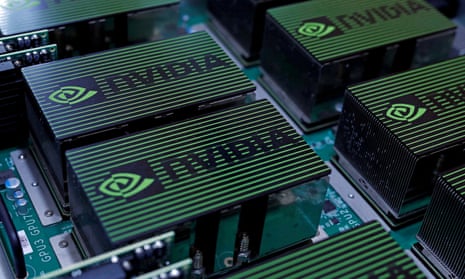The US chip-maker Nvidia has said cryptocurrencies do not “bring anything useful for society” despite the company’s powerful processors selling in huge quantities to the sector.
Michael Kagan, its chief technology officer, said other uses of processing power such as the artificial intelligence chatbot ChatGPT were more worthwhile than mining crypto.
Nvidia never embraced the crypto community with open arms. In 2021, the company even released software that artificially constrained the ability to use its graphics cards from being used to mine the popular Ethereum cryptocurrency, in an effort to ensure supply went to its preferred customers instead, who include AI researchers and gamers.
Kagan said the decision was justified because of the limited value of using processing power to mine cryptocurrencies.
The first version ChatGPT was trained on a supercomputer made up of about 10,000 Nvidia graphics cards.
“All this crypto stuff, it needed parallel processing, and [Nvidia] is the best, so people just programmed it to use for this purpose. They bought a lot of stuff, and then eventually it collapsed, because it doesn’t bring anything useful for society. AI does,” Kagan told the Guardian.
“With ChatGPT, everybody can now create his own machine, his own programme: you just tell it what to do, and it will. And if it doesn’t work the way you want it to, you tell it ‘I want something different’.”
Crypto, by contrast, was more like high-frequency trading, an industry that had led to a lot of business for Mellanox, the company Kagan founded before it was acquired by Nvidia.
“We were heavily involved in also trading: people on Wall Street were buying our stuff to save a few nanoseconds on the wire, the banks were doing crazy things like pulling the fibres under the Hudson taut to make them a little bit shorter, to save a few nanoseconds between their datacentre and the stock exchange,” he said.
“I never believed that [crypto] is something that will do something good for humanity. You know, people do crazy things, but they buy your stuff, you sell them stuff. But you don’t redirect the company to support whatever it is.”
Originally best known for producing powerful graphics cards for PC gamers to play the latest games, it was almost by chance that Nvidia’s products took their place at the heart of the AI boom.
The computationally intensive work of training a new AI system, which can take millions of billions of dollars-worth of computing power, happened to work significantly faster on the types of simple yet powerful processors that had been adopted by gamers.
after newsletter promotion
Two weeks ago, Microsoft said it had bought tens of thousands of Nvidia’s AI-focused processors, the A100 GPU, in order to power the workload of OpenAI. Nvidia has sold 20,000 H100s, the successor to that chip, to Amazon for its cloud computing AWS service, and another 16,000 have been sold to Oracle.
Nvidia also rents access to the chips directly, with its DGX cloud service starting at just under $37,000 (£30,250) a month for just eight H100s wired together in a “cluster”.
Speaking at the company’s annual conference last week, Jensen Huang, Nvidia’s chief executive, described the company as the engine behind “the iPhone moment of AI”, and said the “generative AI” his firm powers would “reinvent nearly every industry”.
Last year, Nvidia’s $40bn takeover of the UK-based tech firm Arm collapsed because of regulatory difficulties.









